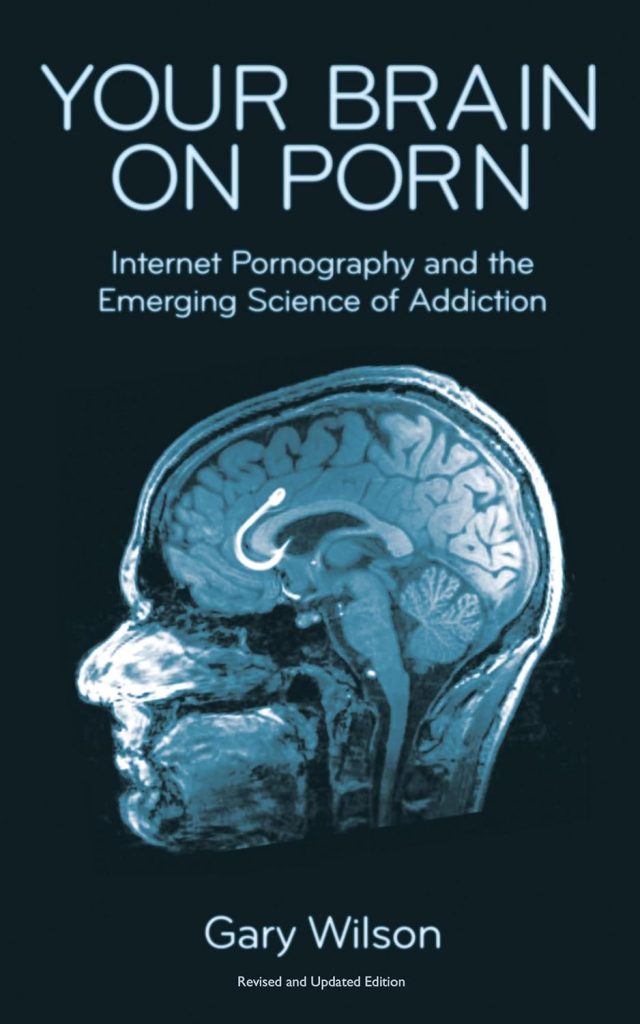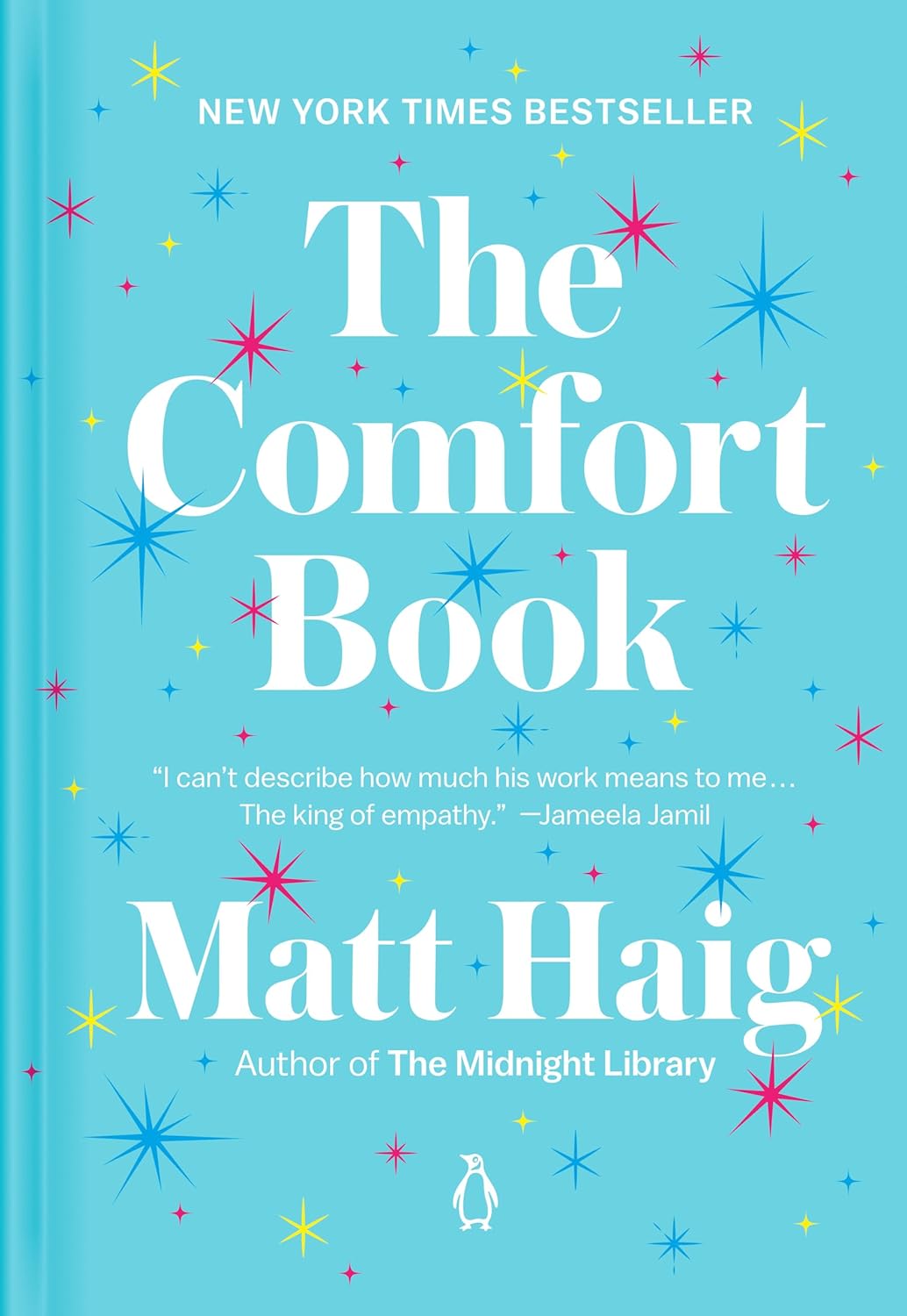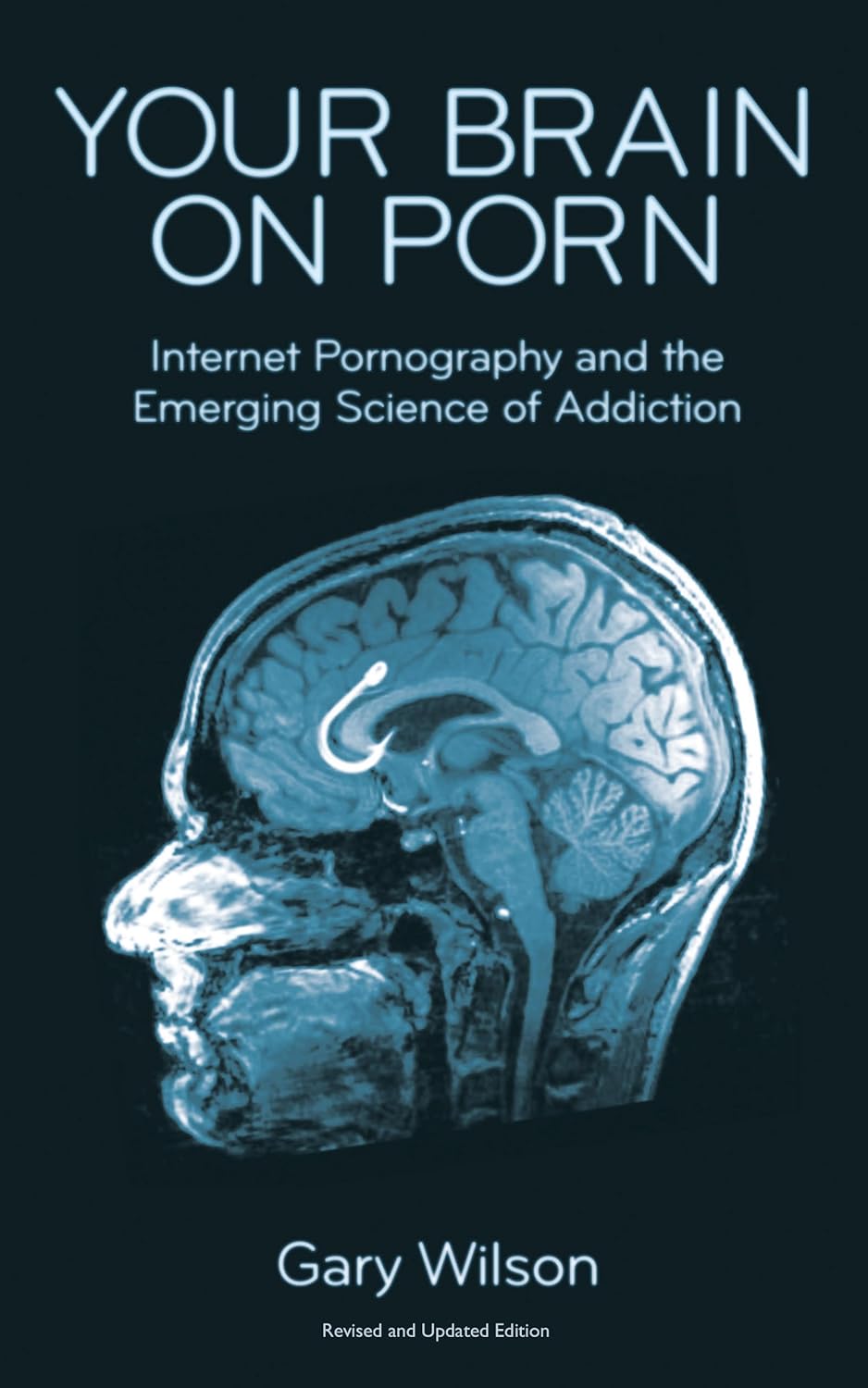
Buy The Book
Your Brain On Porn: Internet Pornography and the Emerging Science of Addiction

About
Your Brain on Porn by Gary Wilson explores the profound effects of internet pornography on the brain and behavior, presenting it as a form of addiction akin to substance abuse. Wilson, an educator with a background in human physiology and anatomy, argues that the pervasive availability of online porn reshapes neurological pathways, leading to issues such as sexual dysfunction, decreased libido, and distorted perceptions of intimacy.
The book combines scientific research with personal testimonies from individuals who have struggled with porn addiction. It outlines how excessive consumption alters reward systems in the brain, making real-life relationships less satisfying. Wilson advocates for awareness and recovery strategies, encouraging readers to consider the long-term consequences of their porn use.
Published in 2014, the book has gained significant attention, contributing to discussions about sexual health and addiction in the digital age. Wilson’s insights resonate particularly with younger audiences grappling with the implications of their online habits.

Spark
Learn
Review
✦ Introduction
The allure of internet pornography often masks deeper issues, leading many to question the ramifications of their consumption. Many individuals find themselves in a cycle of excessive use, initially seeking relief from boredom or stress, only to discover that their habits have spiraled into something troubling. This realization often comes with a host of distressing symptoms, such as erectile dysfunction, diminished sexual desire, and an inability to connect with real partners.
As the internet has transformed access to sexual content, it has also redefined the landscape of sexual experiences. The shift from traditional forms of pornography to the instant gratification provided by high-speed internet has resulted in profound changes in how individuals engage with their sexuality. Users report a growing disconnect from intimate relationships, often feeling more aroused by digital stimuli than by real-life partners.
The experiences shared by countless individuals reveal a pressing need for awareness and understanding of the potential dangers associated with internet porn. These narratives highlight not only the personal struggles faced but also the broader implications for mental health and social interactions. As more people seek help and share their stories, it becomes increasingly clear that this phenomenon warrants serious consideration and discussion in society.
✦ What Are We Dealing With?
Internet pornography has become a pervasive part of modern life, often viewed as a harmless escape from boredom, loneliness, or stress. However, many individuals have begun to recognize that their engagement with porn may be linked to various troubling issues, particularly in the realm of sexual health and interpersonal relationships. This realization gained momentum around 2008-2009 when users on platforms like Reddit’s NoFap community began sharing experiences of erectile dysfunction (ED) that coincided with their porn consumption. These discussions revealed a disturbing pattern: while many could achieve erections through extreme pornographic content, they struggled to perform sexually with real partners.
As these conversations unfolded, it became evident that prolonged exposure to internet pornography might desensitize users to real-life sexual experiences. Many individuals reported that their escalating consumption of increasingly extreme genres of porn altered their sexual preferences and responses. They theorized that abstaining from porn could potentially restore their sensitivity and enjoyment in real-life sexual encounters.
The emergence of the NoFap movement marked a significant shift in how people approached their porn use. Participants committed to abstaining from pornography in hopes of reversing the negative effects they experienced. This community grew as more individuals shared their journeys and the benefits they encountered after quitting.
# The Nature of Internet Pornography
Historically, access to pornography was limited and often required effort to obtain. The rise of high-speed internet has dramatically transformed this landscape, providing users with immediate access to an overwhelming variety of content. This shift has led to a culture where sexual novelty is constantly sought after, making it increasingly difficult for users to achieve satisfaction in real-life interactions.
The ease of access has contributed to a phenomenon where individuals find themselves consuming vast amounts of sexually explicit material without the social barriers that once existed. As users become accustomed to rapid stimulation from online porn, they may struggle to derive pleasure from everyday activities or genuine human connections.
# Personal Accounts and Experiences
Numerous personal accounts from those who have engaged with these online forums illustrate the profound impact that internet pornography can have on mental health and sexual function. Many report symptoms ranging from delayed ejaculation and anorgasmia to complete erectile dysfunction during intimate encounters with partners. These experiences often lead users to question their sexual orientation and preferences, as they find themselves drawn to content that conflicts with their established identities.
Individuals frequently describe feelings of isolation and shame as they grapple with the realization that their porn consumption has negatively affected their relationships and self-esteem. The pervasive nature of internet pornography can create a cycle where users feel trapped in their habits, seeking solace in further consumption rather than addressing the underlying issues.
# The Science Behind It
The scientific community is beginning to explore how chronic exposure to high-speed pornography can alter brain chemistry and structure. Research suggests that excessive consumption may lead to changes in the brain’s reward circuitry, making it more challenging for individuals to derive pleasure from everyday activities or genuine human connections.
Neuroplasticity plays a significant role in this process; as individuals engage repeatedly with pornographic materials, their brains adapt by strengthening neural pathways associated with this behavior. This can result in a diminished capacity for arousal from non-pornographic stimuli, including real-life partners.
Studies have shown that heavy porn users may experience reduced grey matter in areas of the brain associated with cognitive function and emotional regulation. These changes can manifest as difficulties in concentration, increased anxiety, and impaired motivation—further complicating the challenges faced by those struggling with porn addiction.
# The Path Forward
For those recognizing the detrimental effects of internet pornography on their lives, various strategies have emerged within recovery communities. Many individuals find success by adopting a holistic approach that includes abstaining from all forms of artificial sexual stimulation while focusing on rebuilding genuine connections with others.
Support systems such as online forums provide valuable resources for those seeking guidance and encouragement throughout their recovery journey. Participants often share insights about overcoming withdrawal symptoms and regaining control over their sexual health.
In addition to community support, education plays a crucial role in addressing the challenges posed by internet pornography. By fostering open discussions about its potential risks and effects on mental health and relationships, society can help individuals make informed decisions about their consumption habits.
As research continues to uncover the complexities surrounding internet pornography and its impact on human behavior, it becomes essential for society to engage in constructive dialogues about these issues. Acknowledging the potential risks associated with excessive porn use is vital for promoting healthier attitudes toward sexuality and intimacy.
In conclusion, while some may still view internet pornography as harmless entertainment, an increasing number are acknowledging its potential risks and seeking ways to reclaim their lives from its grasp. By fostering awareness and understanding of this phenomenon, we can support individuals on their journeys toward healthier relationships and improved mental well-being.
✦ Wanting Run Amok
The phenomenon of internet pornography has transformed the landscape of human sexuality, leading many to grapple with the consequences of their consumption. Initially, many users perceive porn as a harmless outlet for sexual frustration or boredom. However, as time progresses, it becomes increasingly clear that this seemingly innocuous habit can spiral into addiction and dysfunction.
As I engage with online communities, I notice that users frequently share experiences of escalating consumption patterns. The initial thrill of novelty quickly diminishes, prompting a search for more extreme content to achieve the same level of arousal. This cycle often leads to desensitization, where the brain becomes less responsive to real-life sexual experiences. Consequently, many individuals report difficulties achieving satisfaction with actual partners, as their preferences become distorted by the artificial stimuli provided by pornography.
The concept of “wanting run amok” illustrates how the brain’s reward system can be hijacked by excessive exposure to sexual novelty. This is particularly concerning for younger users whose brains are still developing. The constant barrage of stimulating content creates a feedback loop that reinforces unhealthy sexual habits and preferences. As the brain adapts to this new normal, individuals may find themselves increasingly isolated from genuine human connections and intimacy.
# The Consequences of Excessive Consumption
The repercussions of excessive porn consumption are both profound and multifaceted. Many users report a variety of psychological and physiological issues stemming from their habits. Symptoms such as erectile dysfunction (ED), delayed ejaculation, and diminished libido are becoming alarmingly common among young men who have grown up with easy access to high-speed internet porn. This growing awareness within the medical community acknowledges that porn-induced sexual dysfunction is a legitimate concern.
Research indicates that heavy porn users often experience decreased sexual responsiveness in real-life situations compared to their reactions to pornographic material. This disconnect can lead to feelings of inadequacy, shame, and anxiety during intimate encounters. As individuals struggle to reconcile their desires with their experiences, they may retreat further into the world of pornography, perpetuating the cycle of isolation and dysfunction.
Initially, users may attribute their struggles to other factors such as anxiety or hormonal changes. It often takes time for them to connect their symptoms with their porn use. This realization can be both liberating and terrifying; acknowledging that a seemingly harmless habit is at the root of significant personal issues can provoke deep feelings of shame and confusion.
# The Neuroscience Behind Pornography Addiction
Understanding the neuroscience behind porn addiction sheds light on why these patterns emerge. The brain’s reward circuitry is designed to respond positively to pleasurable stimuli; however, when exposed to constant novelty—especially in the form of high-speed internet pornography—this system can become dysregulated. The ventral striatum, a key area involved in processing rewards, becomes overly tuned to the immediate gratification provided by pornographic material.
This hyper-stimulation leads to neuroplastic changes in the brain that prioritize artificial rewards over natural ones. As a result, everyday pleasures—such as social interactions or intimate relationships—may begin to feel less rewarding compared to the intense stimulation offered by pornography. This shift not only affects sexual functioning but also impacts overall mental health and well-being.
Moreover, studies have shown that heavy porn users may exhibit reduced grey matter in areas associated with cognitive function and emotional regulation. These changes can manifest as difficulties in concentration, increased anxiety levels, and impaired motivation—all of which further complicate recovery efforts.
# The Journey Toward Recovery
Recognizing the negative impact of internet pornography is often the first step toward recovery. Many individuals who have experienced porn-induced dysfunction find solace in online communities where they share their experiences and support one another through the process of quitting. These platforms provide valuable resources for those seeking guidance on how to navigate their challenges.
The concept of “rebooting” has emerged as a popular strategy among those looking to regain control over their sexual health. By abstaining from all forms of artificial sexual stimulation—including pornography and excessive masturbation—individuals aim to reset their brains and restore sensitivity to real-life experiences.
Throughout this journey, many report significant improvements in various aspects of their lives beyond just sexual function. Increased confidence, reduced social anxiety, enhanced focus, and improved mood are common benefits cited by those who successfully quit porn. These positive changes highlight the interconnectedness of mental health and sexual well-being.
# Embracing Genuine Connections
As individuals begin to distance themselves from pornography, they often rediscover the joys of authentic human connection. The process of recovery encourages individuals to engage more meaningfully with others, fostering relationships built on trust and intimacy rather than superficial stimulation.
Many former users report feeling more present during intimate encounters and experiencing deeper emotional connections with partners. This shift not only enhances sexual satisfaction but also contributes positively to overall mental health and self-esteem.
Importantly, discussions surrounding pornography should not be stigmatized or dismissed as moral panic; instead, they should be framed as essential conversations about mental health and well-being in an increasingly digital world. By fostering open dialogues about the effects of internet pornography on relationships and personal health, society can better support those grappling with these challenges.
# Conclusion
The journey through recognizing and addressing porn addiction is complex but ultimately rewarding for many individuals seeking healthier relationships with themselves and others. Understanding the neuroscience behind these patterns helps demystify the struggles faced by countless users today.
As awareness grows around the potential risks associated with excessive porn consumption, it becomes crucial for society to engage in constructive conversations about sexuality in the digital age. By doing so, we can empower individuals to make informed choices about their consumption habits while promoting healthier attitudes toward intimacy and connection in an increasingly disconnected world.
In summary, while some may still view internet pornography as harmless entertainment, an increasing number are acknowledging its potential risks and seeking ways to reclaim their lives from its grasp. By fostering awareness and understanding of this phenomenon, we can support individuals on their journeys toward healthier relationships and improved mental well-being.
✦ Regaining Control
The journey to reclaiming control over one’s life after struggling with internet pornography addiction is both challenging and transformative. Many individuals find themselves trapped in a cycle of compulsive behavior, where the allure of instant gratification overshadows the negative consequences on their mental and physical well-being. However, the path to recovery is not only possible but often leads to profound personal growth and renewed self-awareness.
Initially, recognizing that a problem exists is crucial. Many users may not connect their struggles—such as anxiety, depression, or sexual dysfunction—with their porn consumption. It often takes time for individuals to realize that their issues stem from an addiction to internet pornography rather than other external factors. This realization can be liberating; understanding that the central problem can be addressed is a significant first step toward recovery.
Once the connection between porn use and personal struggles is made, many embark on a journey of “rebooting.” This involves abstaining from all forms of artificial sexual stimulation, including pornography and excessive masturbation. The goal is to give the brain a chance to reset and restore its natural reward pathways, which have been hijacked by the overstimulation of internet porn.
# The Process of Rebooting
Rebooting is not merely about quitting porn; it’s about rediscovering the ability to experience genuine pleasure and intimacy without reliance on artificial stimuli. Many individuals report that during the initial phase of quitting, they experience withdrawal symptoms similar to those associated with substance addiction. These can include irritability, mood swings, fatigue, and even physical sensations like tremors or shortness of breath.
Despite these challenges, many find that perseverance leads to significant improvements in various aspects of their lives. Users often report enhanced clarity of thought, improved concentration, and increased energy levels as they distance themselves from pornography. This newfound mental clarity can lead to better performance at work or school and a more engaged social life.
During this process, individuals frequently share their experiences in online forums dedicated to recovery from porn addiction. These communities provide invaluable support and encouragement as members exchange insights about their journeys. They celebrate milestones together and offer advice on overcoming setbacks. This sense of community can be incredibly empowering for those who have felt isolated in their struggles.
# Insights Gained Through Recovery
As individuals navigate their recovery journeys, they often discover fascinating insights about themselves and their relationship with sexuality. For many, quitting porn leads to a renewed appreciation for real-life connections and intimacy. Users report feeling more present during intimate encounters and experiencing deeper emotional connections with partners.
Moreover, many former users find that their sexual preferences shift back toward healthier norms after abstaining from porn for an extended period. The hyper-stimulation provided by internet porn can distort one’s understanding of sexual attraction, leading some to develop fetishes or preferences that conflict with their values or identities. As they regain control over their consumption habits, many report a return to more conventional sexual interests.
This transformation is not just limited to sexual health; it extends into various areas of life. Users often describe improvements in self-esteem, social skills, and overall mental health. The act of overcoming an addiction fosters a sense of accomplishment and resilience that positively impacts other facets of life.
# The Role of Neuroscience
Understanding the neuroscience behind addiction can also aid in recovery. The brain’s reward circuitry becomes dysregulated through chronic exposure to high-speed pornography. This dysregulation can lead to diminished sensitivity to natural rewards—such as social interactions or intimate relationships—making them feel less satisfying compared to the intense stimulation provided by porn.
Research indicates that heavy porn users may experience changes in brain structure and function, particularly in areas associated with impulse control and decision-making. By abstaining from porn, individuals give their brains a chance to heal and rewire themselves toward healthier patterns of behavior.
Neuroplasticity—the brain’s ability to reorganize itself by forming new neural connections—plays a crucial role in this recovery process. As individuals engage in healthier behaviors and build genuine connections with others, they reinforce positive pathways in the brain that promote well-being.
# Embracing Genuine Connections
A significant aspect of regaining control involves fostering authentic relationships with others. Many users discover that as they distance themselves from pornography, they become more capable of forming meaningful connections with partners and friends. This shift enhances not only sexual satisfaction but also emotional intimacy.
The journey toward recovery encourages individuals to engage more fully with their surroundings and the people in their lives. They often find joy in activities that were previously overshadowed by their addiction—socializing with friends, pursuing hobbies, or simply enjoying quiet moments without the need for stimulation.
This reconnection with reality allows for a richer life experience filled with genuine emotions and interactions. Many report feeling more alive and engaged than ever before as they move away from the isolating effects of pornography.
# Conclusion: A New Beginning
Regaining control over one’s life after struggling with internet pornography addiction is a deeply personal journey marked by challenges and triumphs. While the path may be fraught with difficulties—withdrawal symptoms, moments of doubt, or setbacks—the rewards are often profound.
Individuals who commit to this journey frequently find themselves transformed in ways they never anticipated. They emerge not only with improved sexual health but also with enhanced self-esteem, stronger relationships, and a renewed sense of purpose.
Ultimately, this process is about more than just quitting porn; it’s about reclaiming one’s life from an addiction that has shaped thoughts and behaviors for far too long. Through support from communities, insights gained along the way, and an understanding of the underlying neuroscience, many discover that it is possible to break free from the grip of pornography and embrace a healthier future filled with authentic connections and genuine joy.
As awareness grows around the potential risks associated with excessive porn consumption, it becomes crucial for society to engage in constructive conversations about sexuality in the digital age. By doing so, we can empower individuals to make informed choices about their consumption habits while promoting healthier attitudes toward intimacy and connection in an increasingly disconnected world.
In summary, while some may still view internet pornography as harmless entertainment, an increasing number are acknowledging its potential risks and seeking ways to reclaim their lives from its grasp. By fostering awareness and understanding of this phenomenon, we can support individuals on their journeys toward healthier relationships and improved mental well-being.
✦ Concluding Reflections
Reflecting on the journey through the impact of internet pornography reveals a complex interplay between human behavior, brain chemistry, and societal norms. Many individuals initially approach porn as a harmless escape, but as they delve deeper, they often confront unexpected consequences that can disrupt their lives. The narratives shared by those who have struggled with porn addiction highlight a common theme: the gradual realization that what once seemed like a simple indulgence has morphed into a significant barrier to genuine intimacy and connection.
The experiences recounted by users demonstrate how pornography can hijack the brain’s reward system, leading to desensitization and an ever-increasing need for novelty. This cycle not only affects sexual function but also permeates various aspects of life, including mental health and social interactions. As individuals begin to recognize the detrimental effects of their habits, many embark on a path toward recovery, often finding solace in supportive communities that offer understanding and shared experiences.
Ultimately, the reflections on this topic underscore the importance of fostering open discussions about the implications of internet pornography. By acknowledging its potential risks and encouraging individuals to take control of their consumption habits, society can help mitigate the negative effects on personal well-being and relationships. The journey toward recovery is not just about overcoming addiction; it is also about rediscovering authentic connections and reclaiming a fulfilling life.
For People
– Individuals struggling with porn addiction
– Mental health professionals seeking insights on addiction
– Parents concerned about their children’s exposure to pornography
– Young adults navigating sexual relationships in the digital age
– Educators aiming to understand the effects of pornography on students
Learn to
– Understanding the neurological impact of internet pornography
– Recognizing symptoms of porn addiction and their effects on life
– Learning strategies for recovery and regaining control over habits
– Gaining insights from personal testimonies of recovery
– Improving sexual health and real-life relationship satisfaction









